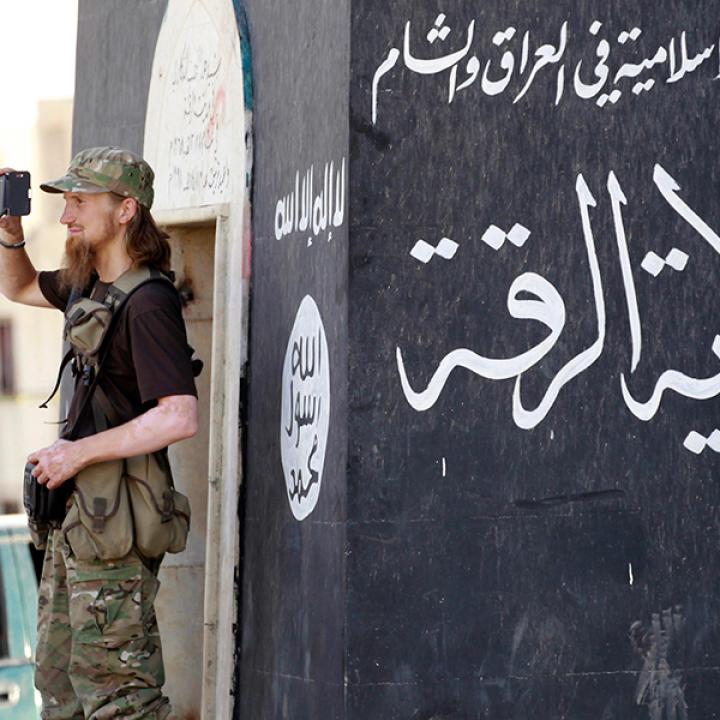
- Policy Analysis
- Articles & Op-Eds
ISIS Has Already Lost the War of Ideas, Despite the Specter of Paris Attacks

The vast majority of Muslims polled in a recent regional survey clearly rejected the bloodthirsty ISIS extremists who pretend to act in their name.
The Paris terrorist attacks feed a false narrative that ISIS has somehow attracted a mass following among Arabs. In fact, the opposite is true. Overwhelming majorities -- around 95% -- of key Arab publics have a negative view of ISIS. A mere 2% to 4% of people in Egypt, Saudi Arabia, Jordan, or Kuwait have even a "fairly positive" view of that organization today.
These are not estimates; these are actual hard data from scientific surveys. I organized and sponsored these surveys in those four countries in August to September of this year. They were conducted by a leading independent, and totally apolitical, regional commercial pollster, who must remain anonymous for fear of reprisal. Each survey used personal interviews among a representative national geographic probability sample of 1,000 adult citizens.
And these results confirm the minuscule popularity of ISIS recorded in the first survey of this kind conducted almost exactly one year earlier. That poll also demonstrated extremely low, single-digit favorability ratings for ISIS in two additional countries: the UAE and Lebanon. In Jordan, where ISIS scored a relatively "high" 8% approval in September 2014, the rating has fallen even further, to just 4%. At this point, therefore, the evidence is completely compelling that ISIS has nothing more than a minuscule base of support in a large portion of the Arab world.
To be sure, even a small group can do some serious damage. But a mass movement ISIS is clearly not. And over the past year, as these surveys demonstrate, its already low popularity among major Arab publics has been shrinking, not rising.
But the numbers, while very solid, do not mean that these major, mostly Sunni Arab publics reject all fundamentalist organizations. The Muslim Brotherhood, for example, still receives favorable ratings from between one-quarter to one-third of the public in each of the four countries recently polled -- even where it has been outlawed. Those controversial views add to the overall credibility of these findings, even as they emphasize how very poorly ISIS fares in Arab public opinion.
Nor does the near universal rejection of ISIS mean that these Arab publics would like to see a religious "reformation" in Islam. Asked if it would or would not be "a good idea to interpret Islam in a more moderate, tolerant, or modern way," just one-fifth said yes in Egypt, Saudi Arabia, Jordan, and Kuwait. Yet ISIS is so extreme and reactionary that it repels even the conservative Muslim majority in all four countries.
Moreover, each public was asked what should be their government's number-one and number-two foreign policy priorities, from a list of six different options. The winner in all four countries was "the conflict against Daesh," or ISIS. By varying margins, that struggle topped all five other options offered, including "the Palestinian-Israeli conflict, the conflict in Syria, the conflict between Iran and Arab countries, the conflict between sects or movements of Islam, or the conflict in Yemen."
One other relevant finding: in each one of these key Arab societies, France is about twice as popular as either the United States or Russia. About one-third of Egyptians, Saudis, Jordanians, and Kuwaitis voice a positive opinion about France. Turkey, a friendly Muslim nation, rates just 12 points higher, on average. By comparison, both the United States and Russia garner positive ratings from a mere 10-16% of these Arab publics.
So by all means let us grieve for the victims of the terrible ISIS atrocities in Paris, and elsewhere. And let us look even harder for ways to combat this evil, anti-Islamic scourge. But let us not make the dangerous mistake of imagining, as ISIS would like us to do, that it is the champion and the wave of the future for the Arab and Muslim masses. That would only be adding senseless and baseless insult to awful injury. For the reality is that, except for a tiny if terribly destructive and sensational fringe, the vast majority of Muslims in every society surveyed clearly reject those fanatical and bloodthirsty extremists who pretend to act in their name.
David Pollock is the Kaufman Fellow at The Washington Institute and director of Fikra Forum. This article was originally published on the Fikra Forum website.
Fikra Forum



